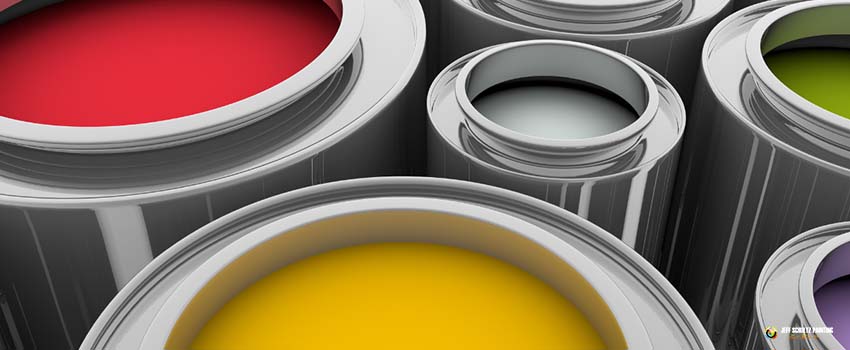Painting on metal requires a unique approach compared to painting on other surfaces.
Working with this material is challenging. The adhesion of paint to metal is inferior to that of wood and plaster. Moreover, metal is susceptible to oxidation and rust. It is essential to use paint for metal surfaces when painting on metal, especially if you want to prevent rust and degradation.
There are both oil-based and water-based metal paints. Oil-based paint is more difficult to apply, but the results are more durable. Water-based acrylic paints are available as spray paints for metal and are generally more tolerable. Learn more about selecting the best paint for metal and the necessary steps in preparing metal for painting.
What is the Best Paint for Metal
As a preliminary step, you must use paint explicitly formulated for metal surfaces. This could be designated as multi-surface paint or spray paint for metal. Not all paints for metal surfaces are appropriate. Always verify the paint’s suitability before beginning a project.
Look for the type of paint for metal that is long-lasting and protective. The finish will last considerably longer and the metal will remain in good condition.
Step by Step Guide to Paint Metals
Painting metal differs slightly from painting other materials, but you don’t have to worry. This step-by-step guide on how to paint metal will make you an expert in no time.
Step 1: Set-up for painting
You must first inspect your metal surface for fractures, chipping, or flaking paint to get started. This inspection is essential because it will better understand the item you’re about to handle and reveal what you got yourself in.
After that, you must ensure that your workspace has adequate ventilation. Then, place a protective fabric over the area you intend to paint to prevent paint spills and splatters.
Step 2: Make the proper preparation
Preparation is the next step in painting metal. When it comes to painting, please always put safety first. Besides a drop cloth and a well-ventilated area, you should also wear safety goggles, gloves, and a face mask.
Now you’re prepared to transform your item. Using a wire brush, start preparing the metal surface. The wire brush will assist in removing any flaking or chipping paint from your surface.
Step 3: Prepare the necessary tools and materials.
Next, you will need to gather the necessary tools and materials for this project. Here is a list of the items:
- Shop Rags
- Scuffing Pads
- Acetone
- Wire Brush
- Sandpaper
Step 4: Primers, Paint, and Sealants
Besides the painting supplies listed above, you will also need a high-quality metal-specific primer. You will then need to determine how much primer you will need for your painting project based on the surface area you intend to cover. But since the primer serves as the base coat, you will only need to apply one coat to your metal.
The next step is to choose high-quality paint for your metal surfaces. Water-Based Acrylic Paint or Oil-Based Paint for Metals are your best options. Each painter will have their own choice, but both of these paints will provide the desired scope and smooth surface.
Finally, you will need to select an appropriate, high-quality sealant to complete the piece you’ve worked hard to create.
Step 5: Preparing the surface to be painted
In this step, you must sand your metal piece with a fine-grit sandpaper. First, you must sand the entire surface to ensure that all areas and crevices are scuffed. Next, wipe down the surface with a damp cloth, allowing it to dry.
Wipe down the surface with a damp cloth to remove any leftover chemical residue, and you’re ready to apply the primer.
When selecting the appropriate primer for your painting project, you must choose one explicitly formulated for metal.
Step 6: Paint application to the metal surface
Once your primer has dried, you are prepared to apply high-quality acrylic water or oil-based paint to your piece.
Use your preferred paintbrush to apply the first coat of paint, cover the metal surface evenly and allow it to dry. If you missed a few spots, you could easily cover them with a second coat.
Afterward, repeat this process as often as necessary to ensure that your finished product has at least two coats of paint.
Step 7: Apply a water-resistant coating
Some paints necessitate the use of a sealer, while others don’t. When painting metal, follow the instructions provided by the paint manufacturer.
After at least 24 hours of drying, you can apply your sealer. You will need a second coat of sealer after the first coat has dried for 24 hours and you’re done.
Step 8: Cure your paint for at least 24 hours
Curing is the final and most straightforward step in the process of painting metal.
Your curiosity about paint transformations has likely been piqued. You may be tempted to use your item immediately, but please wait 36-48 hours for the entire surface to dry completely. Once your piece has been cured for at least 30 days, it should not be exposed to water or household cleaners.
Conclusion
Take a step back and take in all of your hard work. Ultimately, thanks to your efforts, you’ll be amazed at how your rusted, old metal-surfaced project has been transformed into a stunning work of art.
If you’ve followed this step-by-step guide on how to paint metal correctly, you should now be an expert painter and know exactly how to paint metal surfaces.
Let Jeff Schultz Be a Part of the Transformation
Metal paint is an incredible tool that you can use to transform any item made from metal. Remember that a splash of color can transform any item or part of your home from dull to extraordinary and give you the updated look you desire to suit your sense of style. You can do it yourself by following the steps mentioned above or seek the expert services of Sarasota house painters. They are the best in the market to deliver quality results on time with the highest satisfaction from their clients. So, call now for an estimate.









